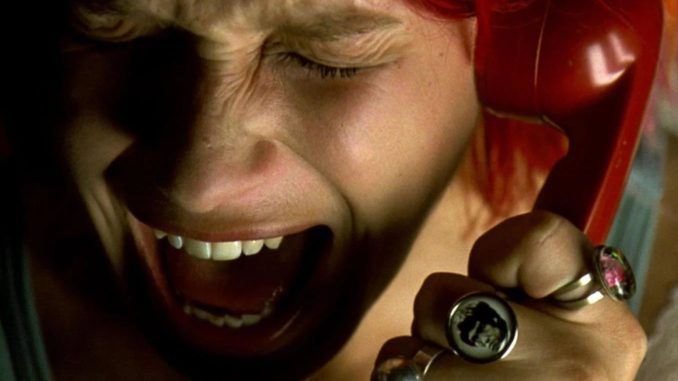
Rating: A+
Dir: Tom Tykwer
Star: Franka Potente, Moritz Bleibtreu, Herbert Knaup, Nina Petri
 For a very simple premise – a girl has twenty minutes to raise DM100,000, or her boyfriend will die – this is a remarkably deep film, a poetic but visceral rumination on fate and the way the tiniest of things can have a tremendous effect on future events, just as in pinball, you can try to shoot the ball the same way, and the outcome will be radically different. While it’s not exactly a new topic, the uniqueness is in the way Tykwer combines his elements: that’s clear, right from an opening which quotes both T.S.Eliot and the 1954 German World Cup-winning coach: “The ball is round, a game lasts 90 minutes, everything else is pure theory. Off we go!” And off we indeed go, at a breathless pace that doesn’t stop, on a cinematic journey which is just as lean, energetic and unstoppable as heroine Lola (Potente), as she charges around Berlin on her quest, like the pinball previously mentioned.
For a very simple premise – a girl has twenty minutes to raise DM100,000, or her boyfriend will die – this is a remarkably deep film, a poetic but visceral rumination on fate and the way the tiniest of things can have a tremendous effect on future events, just as in pinball, you can try to shoot the ball the same way, and the outcome will be radically different. While it’s not exactly a new topic, the uniqueness is in the way Tykwer combines his elements: that’s clear, right from an opening which quotes both T.S.Eliot and the 1954 German World Cup-winning coach: “The ball is round, a game lasts 90 minutes, everything else is pure theory. Off we go!” And off we indeed go, at a breathless pace that doesn’t stop, on a cinematic journey which is just as lean, energetic and unstoppable as heroine Lola (Potente), as she charges around Berlin on her quest, like the pinball previously mentioned.
It’s when she fails, that things get interesting, for Lola gets up and tries again, apparently cranking the clock back through sheer force of will. Or was she simply thinking things through? The film never explains this, but given Lola’s other mad skillz, such as the power of her screams or her ability to lob a telephone receiver in the air and have it land on the cradle, I wouldn’t be surprised if she also can warp the fourth dimension. The focus is almost entirely on Lola, but in one of the many genius touches present, Tykwer lets us see the future of minor characters against whom she brushes. They all change, in the same way Lola’s own future radically alters – based primarily on how she chooses to descend the stairs from her apartment.
This could be seen as an argument for fatalism: if our life is subject to such random whims, what’s the point of making any active choices? But Potente turns it into a cause for hope: even with the sketchiest of backgrounds, she is incredibly easy to root for, because she refuses to give up, no matter what happens. Lola proves that any goal is achievable with persistence, even if the route you take there is completely unconventional. This is, admittedly, life as video-game: if you don’t like the outcome, hit the reset button and have another shot. It’s only in that mind-set the film “makes sense”, with Lola learning from her previous mistakes – this is shown in the second run, when she knows where the safety on a gun is, which had to be explained to her first time round.
Tykwer lobs everything but the kitchen-sink at the viewer, in terms of style. Animation, video, film, colour, black and white, it’s all in there, accompanied by a marvellous soundtrack that is highly listenable by itself, but accompanies the visuals even more perfectly. Despite this – or because of it? – the film still works, impeccably, as an urban love story. Lola is prepared to put it all on the line for Manni (Bleibtreu), and her confidence that she can make it work is unshakeable. Witness the scene in the casino, where she’s about to get thrown out, since her attire is not exactly the norm there. She turns and gazes at the manager, telling him “Just one more game.” It would be a braver man than I to contradict her. Using the strictest definition, one of the finest action-heroines in cinema history.
